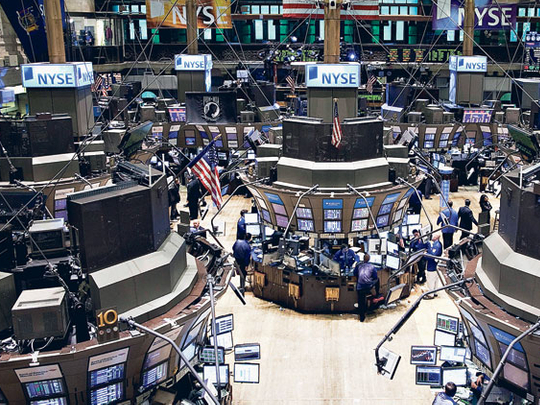
New York : US stocks closed out 2009 with the best performance in six years, but monthly employment figures in the first week of the new year will keep investors focused on what is likely to be 2010's reality — the economy's struggle to recover.
On the data front, the main event was Friday's report from the Labour Department on US non-farm payrolls in December. Economists polled by Reuters have forecast that payrolls shed 20,000 jobs in the final month of 2009, compared with just 11,000 lost in November.
The Institute for Supply Management's report on manufacturing, due tomorrow, is expected to show the ailing sector was still slow to expand in December, while a projected drop in November pending home sales, due on Tuesday, will underscore the housing market's shaky recovery.
Major factors in the stock market's 2009 rally have been ultra-low interest rates and the Federal Reserve's purchases of securities. A repeat of November's much better-than-expected unemployment report could cause investors to worry that the Fed will increase borrowing costs sooner than previously thought.
Stimulus
Thomas Wilson, managing director of institutional investments at Brinker Capital in Berwyn, Pennsylvania, said the unwinding of the fiscal and monetary stimulus, possibly in the second half of 2010, will be a "delicate and deliberate process" that could ruffle markets.
Expectations that interest rates may rise sooner than expected have been helping the US dollar recently, which could make a sustained move higher — if expectations for higher rates increase further.
The stock market moved inversely to the dollar through most of 2009. A continued bounce in the greenback in 2010 could hurt stocks.
"The market's reaction to the generally stronger dollar is going to dictate a lot of the investment themes for the first half of 2010 and maybe the year at large," said Bruce Zaro, chief technical strategist at Delta Global Advisors in Boston.
A turnaround year
Despite 65 per cent gains in the S&P 500 from its 12-year closing low in early March, investors lost money in the last decade when total returns are taken into account. Few will be overwhelmed with the long-term performance of their portfolios.
As 2009 ended, Wall Street capped its first-ever negative decade on a total return basis, even with dividends reinvested.
Investors will remember 2009 as the year that the US stock market made a substantial turnaround from its plunge in 2008 when fallout from the implosion of subprime mortgages and the credit crisis forced Lehman Brothers into bankruptcy — changing the landscape of Wall Street forever.
For 2009, the Dow Jones industrial average climbed 18.8 per cent, the S&P 500 shot up 23.5 per cent and the Nasdaq surged 43.9 per cent.
Friday's non-farm payroll report is expected to confirm that US job losses continued to bottom out in December.
The data is also likely to reinforce expectations that the US unemployment rate will peak in the first half of next year.
The US unemployment rate is expected to edge up to 10.1 per cent in December after it unexpectedly fell to 10 per cent the month before.
In December, the Fed stuck to its commitment to keep interest rates close to zero for an "extended period". Some investors took November's unemployment number as a sign that rates may need to rise faster.
Better economic data "will raise concerns about the possibility the Fed will tighten earlier than most investors anticipate, but given what we're hearing from the Federal Reserve, it seems unlikely", said Carmine Grigoli, chief US investment strategist at Mizuho Securities, in New York.
Most economists in a Reuters poll said they do not expect the Fed to raise interest rates before the end of the first quarter of 2011.
Many analysts are expecting the fledgling recovery in the US housing market to be bumpy. An index of pending home sales is seen dropping 2.1 per cent in November after hitting a 3-1/2-year high the month before — the culmination of nine straight months of gains. That data is due on Tuesday.
The housing recovery is being supported by an $8,000 (Dh29,383) tax credit for the first-time home buyer. Originally due to expire at the end of November, it was extended to the end of April. The possible removal of that support remains a wild card for financial markets.
If the tax credit doesn't get extended again, "that will certainly be a negative on the housing front, plus if we see mortgage rates rising as well in 2010, a combination of those two would be a negative for the housing market," Wilson said.
Mortgage rates generally follow the yield on the 10-year US Treasury note, which rose to 3.8 per cent on Thursday, the last day of 2009, from 3.2 per cent at the end of November. So far, stock investors have looked past that as they focus on signs of an improving economy.
Equities will struggle
UK equities will struggle to build upon their 18 per cent gain in 2009, held back by weak economic growth, the withdrawal of stimulus measures, and the weight of government and consumer debt, analysts warn.
"The decade ended with many of the problems that had caused the bear market still with us, namely an excessive amount of debt," points out Tom Elliott at JP Morgan Asset Management.
Schroders believes the global rally can continue into 2010, if the "sweet spots" of low interest rates and rising company profits drive asset prices higher, but warns of "potential monetary and economic factors that could derail the recovery".
Head of equities, Richard Buxton, says many of these factors are not far down the line. "The UK consumer remains overleveraged, with credit availability still falling as banks continue to shrink their balance sheets. The outlook for 2010 looks increasingly bleak, with the immense government deficit driving higher taxes and public sector job cuts, which will compound a rising unemployment trend." Fund managers believe this combination of economic problems remains the biggest threat to markets in 2010, with just over a quarter of those surveyed by the Association of Investment Companies concerned about low growth, and over one fifth worried about a delayed recovery.
Faced with uncertainty over a reversal of loose monetary policy, Killik & Company advises focusing on shares in companies that can boost their sales in times of weak economic growth, or take market share from rivals, such as Barclays, or pay a dividend yield in excess of bonds.












